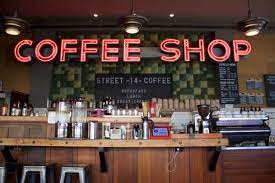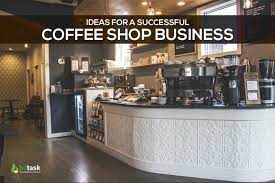



Today’s coffee shops offer a variety of coffee’s from latte’s to espresso’s, mocha’s to Irish coffee’s. Some also offer a variety of light meals, for the breakfast, lunch or late-night crowd. A coffee shop requires a lot of work, as your hours are from early morning to late evening, depending on where your site is located. If in an office block, you’ll probably be open to welcome the earliest of workers who want to enjoy a cup of coffee before starting the day. If you’re in a shopping mall, or near local clubs you’ll probably stay open till late at night to cater for the late-night movie goers or party animals.
Coffee shops could be very rewarding. There is a quick turnaround on tables during the breakfast and lunchtime sessions, though late at night your crowds will be more relaxed. Quick turnaround means that your kitchen staff and waitrons need to be efficient and speedy workers, but it also means that you will have more customers coming through your door per average, than a restaurant. Of course, this all depends on how popular your shop is, so here you need to market and offer the best quality in terms of product and service.
You also may wish to investigate ” Franchised Coffee Shops” first because you will have the benefit of an established brand, concept and support structure. You can visit their shops and see how busy they are, on average, as it will give you an indicator of what you can expect in a similar location in your area. Also find out how many other competing coffee shops are located in your area and what you will be providing that they don’t in order to pull in the customers.
If you bare doing it on your own, remember to use only the best in terms of equipment and, more importantly, coffee beans. There is nothing as horrid as a bad, cold cup of coffee when you have been longing for it all day. Thin, overheated, flavorless or bitter – these are all unacceptable. Why not take a sip from each new pot, to ensure quality every time. If held in machines , ensure that coffee is replenished, as it’s rather frustrating for customers to try and pour their favorable blend, only to find the machine empty. Your first cup should make them want to come back for more. Coffee shops have a certain vibe that enable customers to relax and enjoy, even when grabbing a quick cup or coming in alone for a working lunch. They are not as pricey as restaurants, even when ordering a meal, and provide quick and speedy service. The coffee sector is taking off in South Africa and is being greatly influenced by overseas coffee concepts, and this could be a great business opportunity for you.
“Nestle” dominates the South African coffee market, followed by National Brands with its House of Coffees brand which is the leading brand within fresh coffee. Other coffee brands are Kenna and Ciro (Swiss Brands) and Jacobs (Kraft Foods). Convenience as well as value for money will continue to be key drivers of growth in South African coffee. The trend towards more premium instant coffee among the upper income groups will continue. There may also be a move towards organic coffee among these consumers as the health and wellness trends takes hold. We are seeing a change in the local coffee culture as South African consumers become more adventurous in trying out new options. More and more coffee drinkers have “bean- grinders” at home, indicating a growing shift away from drinking instant coffee. A number of new independent coffee shops with their own in-house coffee roasters have appeared in the past few years.
The Coffee Shop is determined to become a daily necessity for local coffee addicts, a place to dream of as you try to escape the daily stresses of life and just a comfortable place to meet your friends or to read a book all in one. Based on recent experience good coffee is finally become the norm in offices and boardrooms across the country heralding the dawn of a blue chip, coffee culture that appreciates the best life has to offer. This means that coffee has come a long way from the instant, chicory-laden coffee types of old which has seen South Africa going through something of a caffeine revolution in the last few years which has seen a definite move from over-roasted, milky “cappuccinos” topped with mountains of cream and chocolate sprinkles, to cinnamon roasts of flat-whites and cortados.
SOME THINGS TO CONSIDER
1. Ownership
Determine whether owing your own business is for you. Most coffee shop owners are driven by a passion for what they do. This carries them through the hard times and the risk of failure that accompany all small business ventures. In addition to having a passion for your business, you should make sure that your personality is a good fit for the uncertainties of business ownership.
2. Environment
The environment in which you open your coffee shop has a significant effect on it’s success. It is very important to consider factors such as the location, how fast you can grow the business, and what makes your business different from your competitors.
3. Networking
Talk to other small business owners in the area. Networking with other owners of coffee shops will help you understand more about the process from a first-hand source:-
- It is a good idea to ask about the challenges and difficulties they face as well as what strategies they use to overcome these challenges;
- Remember that networking is a two – way street. Make sure you thank all the people who talk with you for their time and input.
4. The Market
You need to decide exactly who your target audience is. Even though most people drink coffee on a regular basis there is no way that you will appeal to everyone. Trying to do so is actually a recipe for failure. Focus on the niche that your coffee shop can appeal to.
5. Set – Up Decision
Determine whether you want to start from scratch or by buying an existing business. Owners of coffee shops frequently look for a new owner to hand the business to. If the business is already fairly successful, taking over an existing business could be a good idea. Another option to consider is franchising.
6. Budget
Starting a coffee shop requires start up capital. How much money you’ll need can vary dramatically, depending on your location, the scale of your venture, and how much investment your property requires.
7. Write a Business Plan
A fully developed business plan will make sure there are no nasty surprises once you begin the process of opening your coffee shop. A Business Plan has many elements. Make sure you have a very clear idea of your shops identity, including what products it will serve, the location and the short term/long term goals.
8. Secure Funding
Once you have a solid business plan in place, you’ll need to secure funding. Starting a coffee shop can be done with just a few thousand rand or it can require several hundred thousand Rand’s. Don’t borrow or spend more than you need. Speak to a professional consultant.